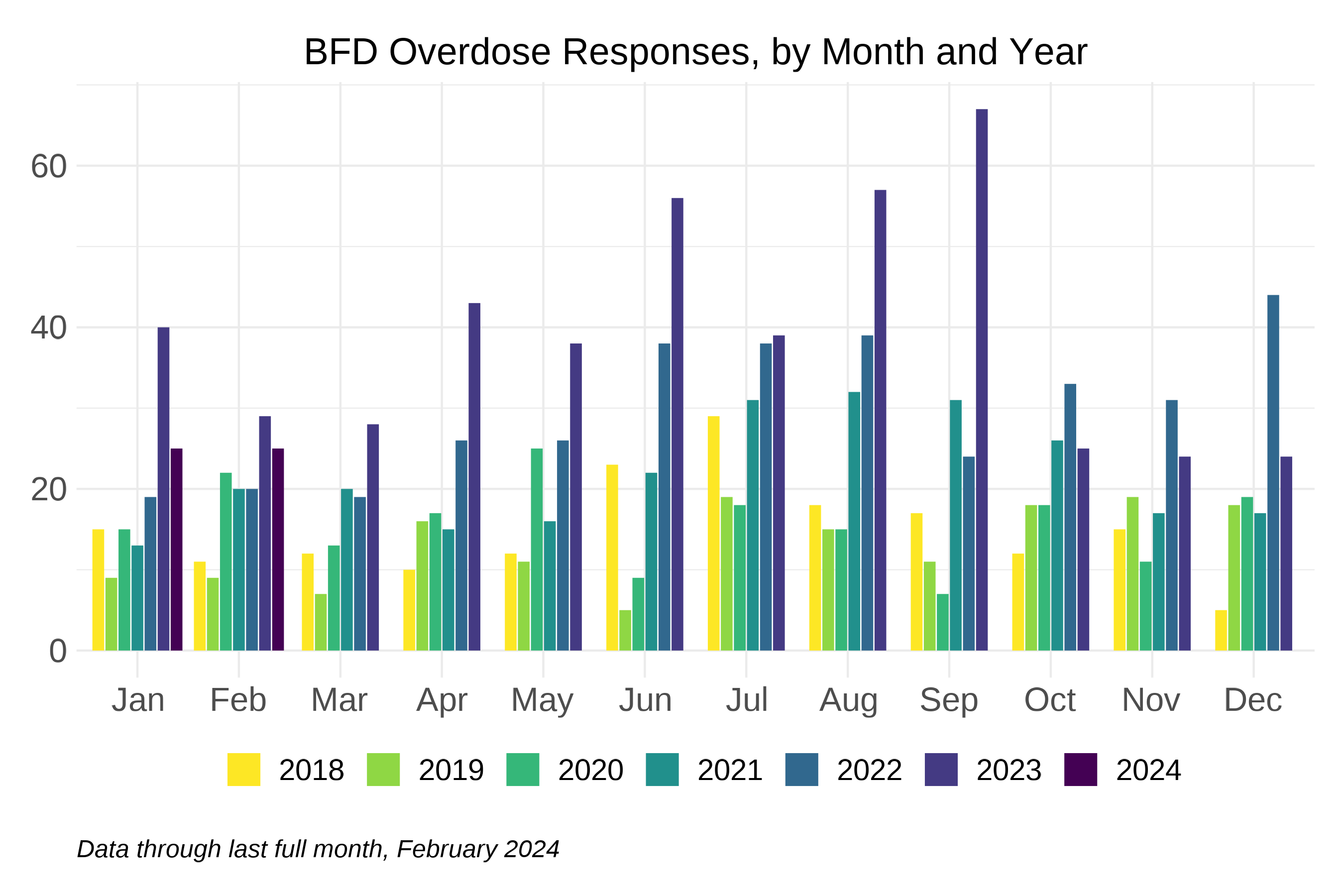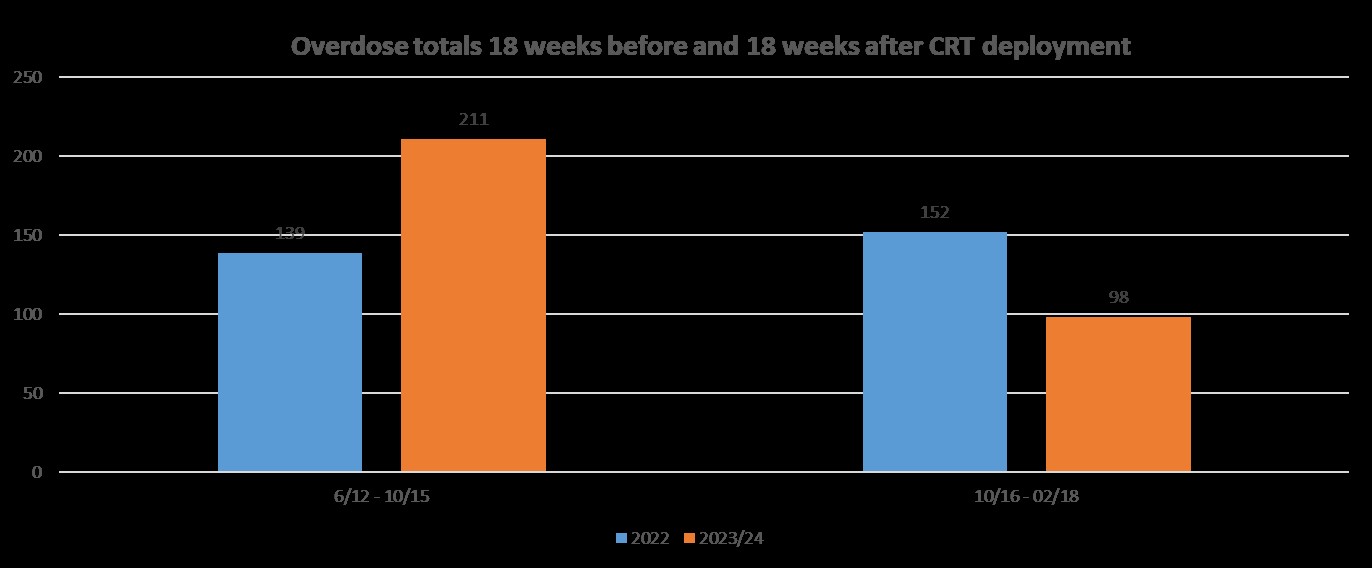Burlington, Vt. – Today, Mayor Weinberger provided an update on recent initiatives to combat the drug crisis and announced that the City has seen its first sustained decrease in monthly overdoses since before the pandemic.
“As the state's largest city and a regional hub for health care, treatment, judicial, and social services, Burlington is at the center of the worsening drug crisis. In 2022 Vermont saw its deadliest year on record, and I feared we had lost our way. In Burlington, we redoubled our efforts and attacked this challenge in every way we can,” said Mayor Weinberger. “Now, we’re approaching six months of declining overdose numbers. We have much more work to do at all levels of government as the rate of overdose deaths in Vermont is unacceptable, and the ongoing community impacts of the drug crisis remain significant. However, I hope this positive trend provides hope to our community and inspires new, urgent actions from the state and federal governments who have far more authorities and resources for this fight than the City of Burlington can muster alone.”
From January 2021 to September 2023, monthly overdose responses from the Burlington Fire Department (BFD) have consistently increased year over year. They dropped from an all-time high of 67 in September 2023 to only 25 in October and have stayed at that level through February.

In October, following participation by Chief Michael LaChance and Burlington Fire Fighter Association President Kyle Blake in the Mayor’s monthly Community Stat meeting aimed at innovating and implementing effective responses to the drug crisis, the BFD launched the Community Response Team (CRT), a pilot program within the fire department that responds to overdoses and provides outreach to people at high risk of overdose. In the four months before Burlington launched its CRT, there were a total of 211 overdose responses by the Burlington Fire Department, in the four months since the launch that number dropped by more than half.

The CRT is just one new initiative to combat the drug crisis that Mayor Weinberger pushed for this year. In February, Burlington opened its low-barrier Elmwood Community Emergency Shelter, which takes a public health approach to ending homelessness. Then, amidst another grim and record-breaking summer for overdoses in Burlington and across Vermont, the Mayor funded the Vermonters for Criminal Justice Reform’s new Re-entry and Recovery Center in Burlington using the City’s opioid settlement dollars.
In January, Mayor Weinberger called for numerous actions at the state level to expand access to treatment, and has since worked with the Howard Center for a plan to both extend hours at the Chittenden Clinic and to create a new methadone dosing location in Burlington. Methadone is a medication for opioid use disorder that is an effective treatment for fentanyl addiction. Methadone is heavily regulated by the federal government, and much harder for patients to access compared to other medications like buprenorphine.
Enforcement against traffickers remains a key component of addressing the drug problem in Burlington. Despite reduced numbers, the Burlington Police Department’s Drug Unit has continued to disrupt and dismantle drug organizations operating in the City. Recent operations by the Drug Unit with local and federal partner agencies have resulted in the seizure of tens of thousands of bags of fentanyl, usually mixed with xylazine, as well as crack cocaine, firearms, and cash.
Services provided through the VCJR Re-Entry and Recover Center
Since opening in August of 2022, the City has remained the lead funder of the new center and VCJR has worked to expand the services available to justice involved community members and launched a Managed Medical Response Partnership program in collaboration with the Johnson Health Center. The program is designed to provide direct medical care and case management support for people experiencing serious wound infections, and who need medical care, mental health care, and medication treatment for opioid use disorder (MOUD). VCJR has served:
- Over 225 individuals total
- 80 individuals in the Contingency Management Drug treatment program
- 99 individuals in the Managed Medical Response Partnership program
Fentanyl and Xylazine Interdiction by the Burlington Police Department
In late 2021, the Burlington Police Department (BPD) Drug Unit began primarily focusing on interdicting xylazine-laced opiates, since investigators began hearing of a new drug supply coming from the Philadelphia area, and the harmful non-opioid tranquilizer was identified by labs in early 2022. Preliminary data from the Vermont Department of Health shows that in 2023 xylazine was detected in 68 out of 171 opioid overdose deaths (40%).
Frequently, organizations in Burlington connect to nearby “source cities” that supply our area with illegal drugs. While these organizations rely heavily on local community members, it is typically out-of-state members of the organization who oversee trafficking in the Burlington area. This was true of recent BPD Drug Unit operations:
- In September 2023, BPD investigators executed a Vermont State search warrant at a residence on North Champlain Street. The target of the investigation, Roosevelt Smith, was located within the apartment and arrested for multiple drug sale charges, Fentanyl Trafficking, Cocaine Trafficking, and Fentanyl Transportation into the State.
- In November 2023, following a months-long investigation, BPD officers executed a federal search warrant on Walnut Street. The Drug Enforcement Agency and the Vermont State Police assisted in the operation, ultimately seizing a total of 17,000 bags of fentanyl. Talbert Hill and Samuel Bennett, both of Philadelphia, were arrested and charged in federal court.
- In January 2024, BPD officers executed a search warrant at a residence on Saint Paul Street which yielded multiple firearms and evidence of drug distribution. Jahking Allah, of Quaker Hill, Connecticut, was taken into custody related to drug offenses.
Over the past few years there have also been more than a dozen federal convictions, thanks to the BPD’s tremendous partnership with the Drug Enforcement Administration (DEA) and the United States Attorney’s Office for the District of Vermont, including recent sentencing announcements for older drug-related cases involving money laundering, hundreds of thousands of dollars seized, and multiple firearms recovered.
Success of the Community Response Team
In October 2023, the Burlington Fire Department (BFD) launched the pilot of the Community Response Team (CRT), which creates a triage-style system of care that better fits overdose responses and provides opportunities for proactive engagement with repeat and potential accidental overdose victims in a non-emergency setting. The CRT is comprised of two overtime BFD employees staffing a current department-owned vehicle and is funded by opioid settlement dollars. Current funding will support the pilot through June. The BFD continues to explore innovative tactics to reduce overdoses and promote treatment engagement, including plans to introduce prehospital initiation of buprenorphine for overdose victims revived in the community later this spring. Since launching in October of 2023, the CRT has:
- Had over 1,200 engagements with patients and community members
- Distributed 157 overdose kits (I.e. Narcan)
- Referred 25 individuals to bridge services providers
- Attended as the primary response unit on 184 medical incidents
- Staffed for an average of 58 hours per week, relying on BFD members to work an extra 116 hours of voluntary OT per week.
Initiatives to Expand Access to Methadone Treatment
Mayor Weinberger serves on the State’s Opioid Settlement Advisory Committee, which last year recommended over $7 million in initiatives approved by the legislature and Governor last May, including $2 million for expanded access to methadone treatment. To date, none of the funds for methadone expansion have been deployed. Access to MOUD is a critical strategy to help reduce the alarming rate of opioid-related overdoses and deaths in our community, and methadone is an effective treatment for patients addicted to fentanyl. Since last spring, Mayor Weinberger has worked with leaders of the Howard Center and the Chittenden Clinic to identify a path to rapidly expand access to methadone in Burlington and Chittenden County, including by:
- Advocating for new funding for expanded hours at existing clinics for the FY25 appropriations of settlement funds
- Supporting an RFP by Howard Center submitted in January to create a dosing location in Burlington, the dosing location would:
- Provide vital services, including medication administration and service coordination for people receiving MOUD
- Be collocated with a federally qualified health center (FQHC), the Community Health Center (CHC) Safe Harbor site and facilitate greater access to primary care services, including wound care;
- Create an opportunity to induct new individuals diagnosed with opioid used disorder onto MOUD;
- Be in close proximity to the Turning Point Center, improving access to peer recovery services for patients.
Update on Elmwood Community Emergency Shelter
As part of the ten-point Action Plan to Fulfill Housing as a Human Right in Burlington from December of 2021, Mayor Weinberger set a goal of investing in a new temporary emergency shelter to advance a public health approach to ending homelessness, and in February of 2023 the City opened the Elmwood Emergency Shelter Community under the management of Champlain Housing Trust (CHT). Today, guests of the Elmwood Shelter continue to make strides with connection to supportive services including medical care, mental health care, substance use disorder treatment, work training and housing case management. Since opening, Elmwood has served:
- 77 individuals total, with 33 guests currently
- 41 individuals have accessed services at Elmwood or through referrals, including 11 for substance use disorder treatment
- 3 individuals have accessed permanent housing, and everyone is connected with housing navigation services following intake
For the first time, the City, instead of one of the local service non-profit agencies, operated the annual Winter Warming Shelter which between December 15 and now has served nearly 150 individual guests and provided over 1,300 bed nights total. With support from the Vermont Department of Health, shelter staff have partnered with both the CRT and nurses from Community Health Centers to provide direct care and connection to treatment and harm reduction services at the City's three low-barrier shelters.
###